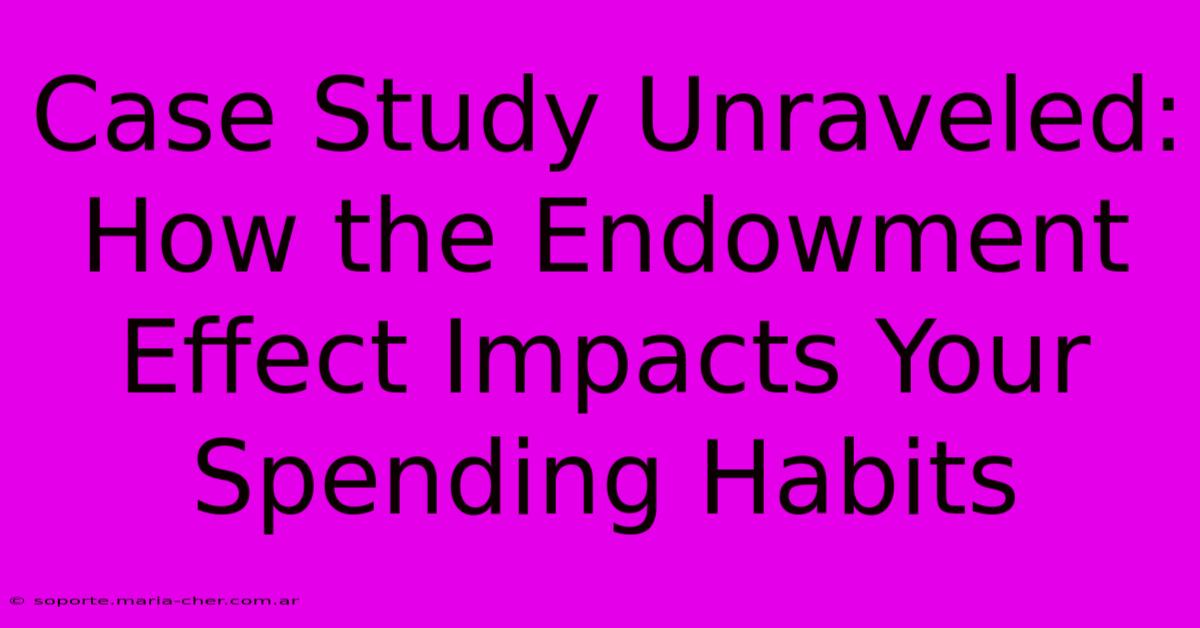Case Study Unraveled: How The Endowment Effect Impacts Your Spending Habits

Table of Contents
Case Study Unraveled: How the Endowment Effect Impacts Your Spending Habits
The way we value things is often irrational. We don't always make decisions based on pure logic and objective analysis. A fascinating psychological phenomenon, the endowment effect, significantly influences our spending habits, often without us even realizing it. This case study delves into the endowment effect, exploring its mechanisms and providing practical examples of how it affects our everyday financial choices.
Understanding the Endowment Effect
The endowment effect, also known as the ownership effect, describes our tendency to place a higher value on things we own simply because we own them. This bias affects our decisions to buy, sell, or trade goods and services. We're more likely to demand a higher price for something we possess than we'd be willing to pay to acquire it. This disparity highlights the irrationality at play.
Key aspects of the endowment effect:
- Increased perceived value: The moment we possess something, its perceived value increases in our minds. This isn't necessarily a reflection of its market value but rather a subjective valuation skewed by ownership.
- Loss aversion: We feel the pain of a loss more strongly than the pleasure of an equivalent gain. This contributes to our reluctance to part with possessions, even if a financially advantageous offer is presented.
- Cognitive bias: The endowment effect is a cognitive bias, meaning it's a systematic error in thinking that affects our judgments and decisions.
Case Study: The Coffee Mug Experiment
One of the most famous experiments illustrating the endowment effect involves coffee mugs. Participants were randomly divided into two groups:
- Group A: Received a coffee mug and were then asked the minimum price they would accept to sell it.
- Group B: Were not given a mug but were asked the maximum price they would pay to buy one.
Consistently, Group A (mug owners) demanded significantly higher prices than Group B was willing to pay. This clearly demonstrates the endowment effect in action; simply owning the mug inflated its perceived value for the owners.
How the Endowment Effect Impacts Your Spending Habits
The endowment effect isn't just a quirky psychological quirk; it has real-world implications for our spending habits. Consider these scenarios:
1. Selling Used Goods:
Do you price your used items higher than their actual market value? This is a classic example of the endowment effect. Because you've owned the item, you've become emotionally attached to it, increasing its value in your eyes. Setting a more realistic price, based on market research, helps mitigate this bias.
2. Negotiating Prices:
The endowment effect can also impact negotiations. Whether buying a car, a house, or even a used phone, sellers might overvalue their possession due to ownership, making the negotiation process more difficult.
3. Investing & Stocks:
Investors often hold onto losing stocks for too long, hoping their value will recover. This is driven by loss aversion – the pain of selling at a loss feels more significant than the potential gains from investing elsewhere.
Overcoming the Endowment Effect: Strategies for Smarter Spending
While the endowment effect is a powerful force, we can learn to manage its influence on our spending decisions:
- Objectivity is key: Before making a financial decision, detach yourself emotionally. Consider the objective value of an item, ignoring sentimental attachments.
- Market research: Before buying or selling, research market prices to obtain a realistic valuation.
- Delayed gratification: Don't rush into decisions. Take time to consider the pros and cons, allowing reason to prevail over emotion.
- Consider opportunity cost: Think about what you could gain by investing your money elsewhere. Holding onto an underperforming asset can have significant opportunity costs.
Conclusion
The endowment effect is a powerful psychological force that significantly shapes our spending habits. Understanding this bias is the first step towards making more rational and financially sound decisions. By recognizing the endowment effect’s impact and employing strategies to mitigate its influence, you can take control of your spending and make better choices for your financial well-being. Remember, objective evaluation and a detached perspective are your best allies in overcoming this common cognitive bias.

Thank you for visiting our website wich cover about Case Study Unraveled: How The Endowment Effect Impacts Your Spending Habits. We hope the information provided has been useful to you. Feel free to contact us if you have any questions or need further assistance. See you next time and dont miss to bookmark.
Featured Posts
-
The Ultimate Guide To Colourful Vs Colourful Unraveling The Spelling Mystery
Feb 07, 2025
-
Uncover The Secrets Of Effective Flyer Marketing The Empty Canvas Technique That Drives Traffic
Feb 07, 2025
-
Rugged And Refined Discover The Allure Of Gritty Textures In Design
Feb 07, 2025
-
The Wireframe Wizard Unleash The Magic Of Data Enhanced Designs
Feb 07, 2025
-
Master The Art Of Neutral Responses Eliminating Response Bias For Informed Decisions
Feb 07, 2025
